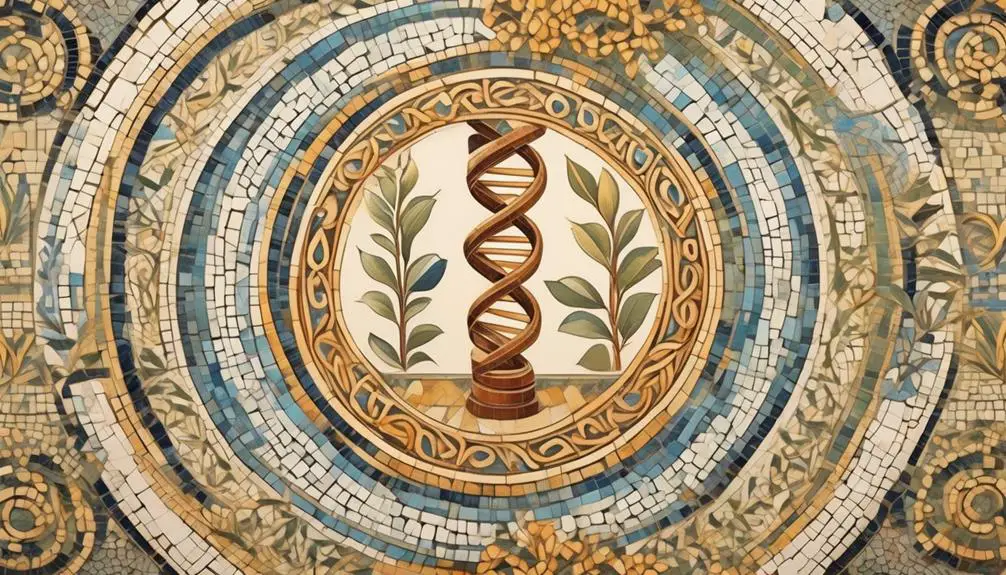As a genetic historian specializing in Hellenic lineage, my experience navigating the labyrinth of DNA testing has been profoundly personal.
Delving into my own Greek roots, I believe the journey of self-discovery is as important as the test itself.
Through careful comparison and consideration, I found a DNA test that not only provided a comprehensive view of my ancestry but also valued privacy.
Connecting with distant relatives and piecing together my family's odyssey across the Aegean Sea, I've come to appreciate the depth of our shared heritage.
This quest has truly been a bridge between my ancestral past and my present identity.
Key Takeaways
- AncestryDNA, 23andMe, and FamilyTreeDNA are recommended DNA testing companies for Greek ancestry due to their extensive genealogy databases.
- Genetic markers and haplogroups can reveal the paths and populations of Greek ancestors, providing insights into ancient migration patterns.
- Privacy and data security should be carefully considered when choosing a DNA testing service, including reviewing privacy policies and being cautious about opting into research programs.
- Interpreting Greek DNA results involves understanding ethnicity estimates, common haplogroups, and utilizing DNA and genealogy applications to trace family ties back to Greece.
Understanding Greek Ancestry
Delving into Greek ancestry through DNA testing can reveal a tapestry of genetic influences, from ancient indigenous roots to waves of migrations that have shaped your unique lineage. You'll find that Greek genealogy is a rich field, blending stories of Greek families with the hard data of ancestry DNA.
With DNA analysis to trace your roots, you can embark on family tree research that's underpinned by genealogy and genetic testing. Companies like AncestryDNA, 23andMe, and FamilyTreeDNA provide access to extensive genealogy databases and offer ethnicity results that may surprise you.
This journey of genetic genealogy could unearth deep connections to the past, reflecting the diverse heritage of Greek ancestry. Be prepared, however, as these discoveries might also challenge what you've always believed about your family's history.
Top DNA Tests Reviewed
When exploring your Greek heritage, selecting the right DNA test is crucial, as each service offers unique insights into your ancestry. Here's what you need to know about the top DNA tests:
- AncestryDNA Test: Boasts extensive databases for family-matching and ethnicity estimates, including Greek heritage, but can't differentiate between maternal and paternal lineages.
- 23andMe: Offers detailed results for both maternal and paternal lineages, adding depth to your understanding of your Ancient Greek roots and genetic makeup.
- FamilyTreeDNA: Excels in genealogy research and ancestry with comprehensive tools for analyzing both sides of your family history.
- Privacy Considerations: Each DNA testing company has its own privacy policy—essential to review as it affects more than just genealogy.
Choose the best DNA testing company based on what aspects of your ethnic origins you're most curious about.
Genetic Markers and Haplogroups

Understanding the genetic markers and haplogroups in your DNA test results can shed light on the paths your Greek ancestors took and the populations they belonged to. Haplogroups are like branches on the human family tree, grouping people with a common ancestor. By analyzing your ancestral DNA, especially through your Y and mtDNA haplogroup, you'll unveil connections to major haplogroups and learn about the variety of haplogroups present in different areas of Greece.
Your DNA test kit dives into autosomal DNA for ethnicity results, revealing relatives within the last few generations. But it's the common Y and mtDNA markers that trace your lineage back even further, uncovering the ancient migration patterns and rich tapestry of your Greek heritage.
Privacy and Data Security
As you explore your Greek ancestry through DNA testing, it's crucial to consider how your genetic information is protected and used by the testing service. Here are key aspects to keep in mind:
- Review Privacy Policies: Understand the measures the DNA testing service takes to secure your genetic data, including your DNA sample.
- Data Use Implications: Be aware of how your DNA data might be used beyond ethnicity results, such as in medical or legal contexts.
- Opt-In Research Programs: Consider the consequences of allowing your DNA test results to be used for research that could monetize your genetic data.
- Unexpected Revelations: Recognize that a home DNA test can reveal surprising information about biological parents, which might have significant privacy implications.
Interpreting Your Greek DNA Results

Upon receiving your Greek DNA results, it's essential to know how to interpret the ethnic percentages and ancestral connections they reveal.
The ethnicity results provide an overview of your genetic makeup, showing connections to various ethnic groups, including those in Eastern Europe. Common haplogroups may be identified, offering clues to your paternal and maternal lineages.
These genetic traits are part of a larger puzzle, and DNA and its applications in genealogy can further your analysis to trace family ties back to Greece.
Understanding your genetic heritage involves more than just percentages; it's about piecing together information about your ancestors to construct a more complete picture of your lineage and its origins.
Frequently Asked Questions
Which DNA Company Is Most Accurate for Ethnicity?
You're seeking the most accurate DNA company for ethnicity; consider one with advanced ethnicity algorithms, large sample sizes, and the ability to cross-reference databases for precise regional specificity and historical migrations. Address privacy concerns carefully.
How Do I Know if I Have Greek Ancestry?
To discover if you've Greek ancestry, explore your family stories, study Greek myths, and consider your connection to olive groves, maritime heritage, and the Mediterranean diet, all reflecting Greek influence and genetic markers.
Which DNA Test Is Most Accurate for European Ancestry?
For European ancestry, you'll want a DNA test that's precise in ethnic estimation, like autosomal testing, which analyzes regional variations and genetic markers to track historical migrations through chromosomal analysis and data interpretation.
What Is Greek and Balkan Dna?
Your Greek and Balkan DNA reflects ancient origins, with genetic markers tracing population history back to Mycenaean, Minoan, and Thracian roots, as well as Peloponnesian, Byzantine, Spartan, and Ottoman influences in your lineage.
Conclusion
You've explored your Greek roots through the best DNA tests, delved into genetic markers, and considered data security.
Now, with your results in hand, you're ready to embrace your heritage. Connect with relatives, dive into family history, and celebrate the rich tapestry that's uniquely yours.
Remember, this journey into your past paves the way for a deeper understanding of who you are. Embrace it with pride and share your newfound knowledge with the world.

Throughout his career, Andras Kovacs has developed a deep understanding of DNA and its applications in genealogy and genetic testing. He has helped thousands of individuals uncover their ancestral heritage, using cutting-edge DNA analysis to trace family lineages and reveal connections across generations.

